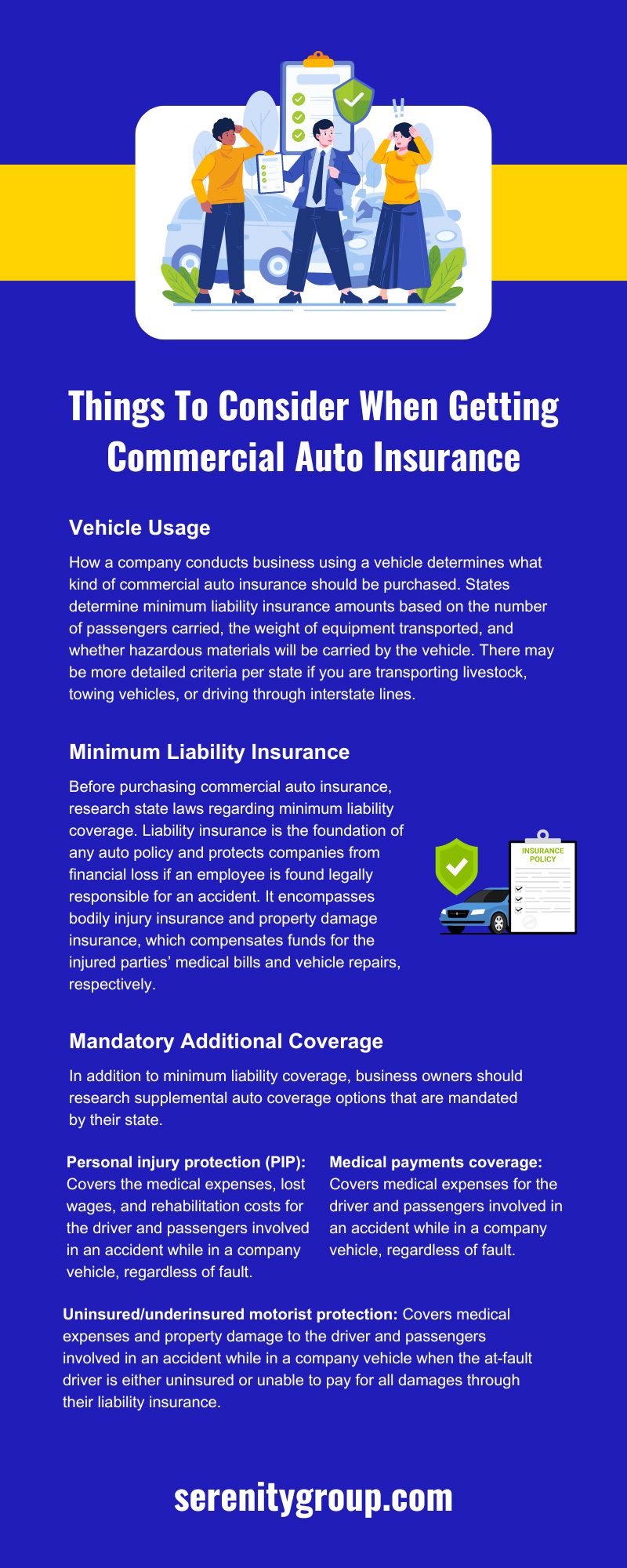Things To Consider When Getting Commercial Auto Insurance

Running a small business comes with its own set of challenges, but adequately insuring your vehicles shouldn’t be one of them. Commercial auto insurance is essential for protecting your business from potential financial losses. Whether you operate a fleet of delivery trucks or a single company car, having the right commercial auto insurance coverage is crucial to safeguarding your assets and ensuring business continuity.
Understanding the specifics of your policy options can help you optimize your business strategy to maximize profitability. We’re here to help you understand the key factors to consider when getting commercial auto insurance, ensuring you make an informed decision that suits your business needs.
Vehicle Usage
How a company conducts business using a vehicle determines what kind of commercial auto insurance should be purchased. States determine minimum liability insurance amounts based on the number of passengers carried, the weight of equipment transported, and whether hazardous materials will be carried by the vehicle. There may be more detailed criteria per state if you are transporting livestock, towing vehicles, or driving through interstate lines. Insurance companies also use this information to help assess risk and determine the appropriate coverage.
Other Vehicle Details
Insurance providers require additional details about your business vehicles to determine your monthly premium. The make, model, age, and condition of your vehicle also contribute to the risk profile of a business and its drivers. The more vehicles you add to a policy, the higher you can expect the monthly premium to be. Additionally, specialized vehicles like refrigerated trucks or those with custom modifications may require specific coverage options.
Minimum Liability Insurance
Before purchasing commercial auto insurance, research state laws regarding minimum liability coverage. Liability insurance is the foundation of any auto policy and protects companies from financial loss if an employee is found legally responsible for an accident. It encompasses bodily injury insurance and property damage insurance, which compensates funds for the injured parties’ medical bills and vehicle repairs, respectively.
Mandatory Additional Coverage
In addition to minimum liability coverage, business owners should research supplemental auto coverage options that are mandated by their state. Let’s review the three most commonly required coverage types beyond standard liability coverage.
- Personal injury protection (PIP): Covers the medical expenses, lost wages, and rehabilitation costs for the driver and passengers involved in an accident while in a company vehicle, regardless of fault.
- Medical payments coverage: Covers medical expenses for the driver and passengers involved in an accident while in a company vehicle, regardless of fault.
- Uninsured/underinsured motorist protection: Covers medical expenses and property damage to the driver and passengers involved in an accident while in a company vehicle when the at-fault driver is either uninsured or unable to pay for all damages through their liability insurance.
Optional Additional Coverage
Business owners may want to consider adding optional auto insurance coverage that can further safeguard their company from substantial financial losses. Here are six types of optional coverage you can purchase for commercial vehicles.
Comprehensive/Collision Coverage
Comprehensive and collision coverage protects your vehicles against various risks. Comprehensive insurance will pay for repairs to a company vehicle damaged in a single-car accident or collision with another vehicle. Comprehensive insurance will pay for losses in non-collision incidents like theft, vandalism, or natural disasters.
Roadside Assistance
Roadside assistance is incredibly beneficial in the event a vehicle unexpectedly breaks down. This assistance accounts for on-scene labor, repairs, and towing to prevent excessive downtime. Some instances in which a vehicle may need roadside assistance include flat tires, dead batteries, and empty gas tanks.
Gap Insurance
Gap insurance is essential for companies that finance or lease their vehicles. It covers the difference between the vehicle’s actual cash value and the amount owed on the loan or lease if the vehicle is totaled or stolen.
Hired/Non-Owned Insurance
Hired insurance extends liability coverage to vehicles your business temporarily rents, leases, or borrows for business operations. Non-owned insurance extends liability coverage to employees’ personal vehicles when used for business errands.
Rental Car Reimbursement
Rental car reimbursement ensures that you have access to a temporary replacement vehicle if yours is being repaired after an accident. This coverage minimizes downtime and keeps your business operations running smoothly.
New Vehicle Replacement
If a company vehicle is totaled, new vehicle replacement coverage ensures you can replace it with a new one of comparable value, which reduces financial strain and maintains your business’s efficiency. This is most beneficial for businesses that have invested in high-end or specialized vehicles.
Employees Listed on Policy
Businesses must specify the individuals covered by commercial auto insurance in case of an accident. This information can affect insurance rates if listed individuals have a history of traffic violations or accidents. It is also important to understand the types of drives that can be listed on a commercial auto policy and the amount of coverage each will receive.
Types of Drivers Listed
- Named insureds: Named insureds are the primary individuals who are covered under the policy and receive the broadest scope of coverage. This typically includes the business owner and any specifically named employees.
- Permissible drivers: Permissible drivers are those who have permission to use the vehicles on the policy. This can include part-time employees or temporary staff; listing these individuals as permissible drivers ensures they are covered while driving for business purposes.
- Omnibus insureds: Omnibus insureds are anyone who will use the vehicle with the named insured’s permission. These people can be held vicariously liable for an accident that they were not directly responsible for.
- Excluded drivers: Excluded drivers are individuals who are forbidden to operate company vehicles and are excluded from your company’s auto insurance coverage.
Deductible and Policy Limits
Choosing the right deductible and policy limits is vital for any insurance policy. A higher deductible can indeed lower your premium, making your monthly payments more affordable; however, it also means you will face increased out-of-pocket costs if you need to file a claim. On the other hand, a lower deductible will raise your premiums but reduce your expenses during a claim.
Balancing deductible amounts with policy limits ensures you have adequate coverage to protect your assets without facing an excessive financial burden. It’s essential to carefully evaluate your financial situation and risk tolerance to make an informed decision.
Reputable Insurance Provider
Selecting a reputable insurance provider guarantees reliable coverage and excellent customer service. A trustworthy insurance provider will help you navigate the complex world of commercial vehicle insurance, ensuring you have the coverage you need to protect your business.
At Serenity Group, we help companies get commercial auto insurance by comparing rates of leading brands to find the most affordable policy. Visit our website to get a quote today.


Recent Comments